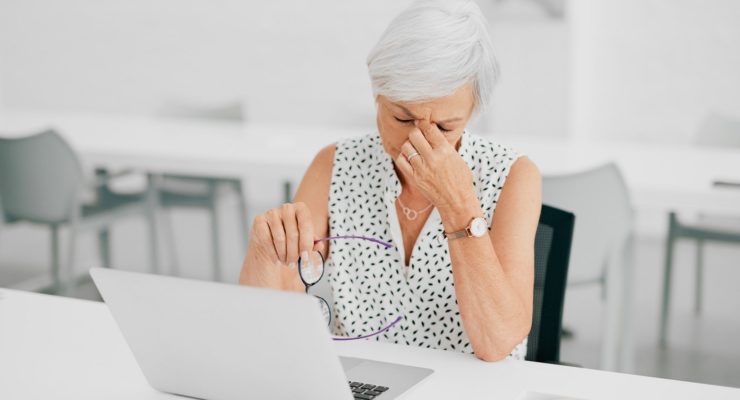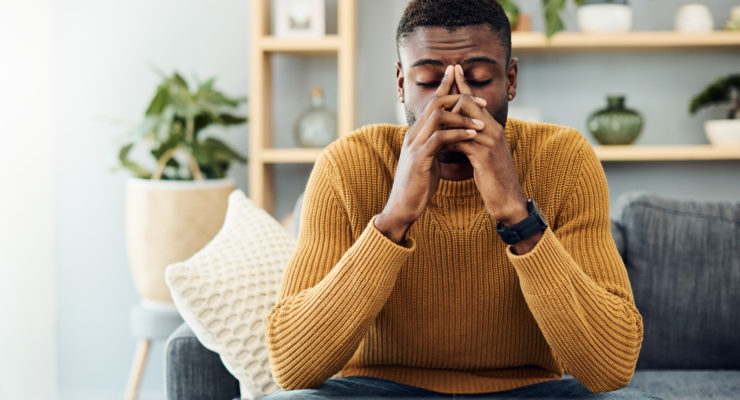Worries about family, work, health and the world around us can fill our days with stress. Stress can lead to lack of sleep, headaches and bad moods that never seem to go away. That’s because stress is a real physical reaction to fear and pressure.
When we are stressed, our bodies release stress hormones known as adrenaline and cortisol. Together, these substances alter many systems within the body, increasing heart rate, elevating blood pressure, boosting energy are more. This stress response works well for short-term threats.
When life leaves us feeling stressed for days on end, this process begins to damage our everyday functioning. “The long-term activation of the stress response system and the overexposure to cortisol and other stress hormones that follows can disrupt almost all your body’s processes,” says Mayo Clinic. Chronic stress can cause serious health problems, including heart disease, stroke, difficulty with digestion, weight gain and depression. Learn more about the symptoms of chronic stress at the link below:
Stress Management: 7 Symptoms and Signs of Chronic Stress
Read More 
While it can be hard to avoid stress altogether, you can take active steps to help you reduce its impact on your well-being. Here are 10 simple strategies that you can use to release stress in the new year for a happy and healthy 2022.
1. Breathe deep.

There is nothing more natural than breathing. But when we are feeling stressed out, our normal breathing can become more rapid and shallow, diminishing the amount of fresh oxygen we pull into our bodies. Instead, focus on deep breathing.
According to the University of Michigan Health, “Deep breathing is one of the best ways to lower stress in the body. This is because when you breathe deeply, it sends a message to your brain to calm down and relax. The brain then sends this message to your body. Those things that happen when you are stressed, such as increased heart rate, fast breathing, and high blood pressure, all decrease as you breathe deeply to relax.”
There are many different breathing exercises that you can do to relax and decrease stress. “Although these shouldn’t be seen as a replacement for therapy or a cure for severe anxiety, they can be a free, simple tool for both short-term relief and long-term benefit,” says The Greater Good Science Center at the University of California, Berkeley.
One of the easiest to learn is “belly breathing.” To do it, sit or lie flat and place one hand on your stomach just below your ribs. Place your other hand on your chest. Breathe in deep through your nose, letting your belly push your hand out (your chest shouldn’t move). “Breathe out through pursed lips as if you were whistling,” says the University of Michigan Health. “Feel the hand on your belly go in, and use it to push all the air out.” Repeat this three to 10 times, taking your time with each breath.
2. Flex and release.
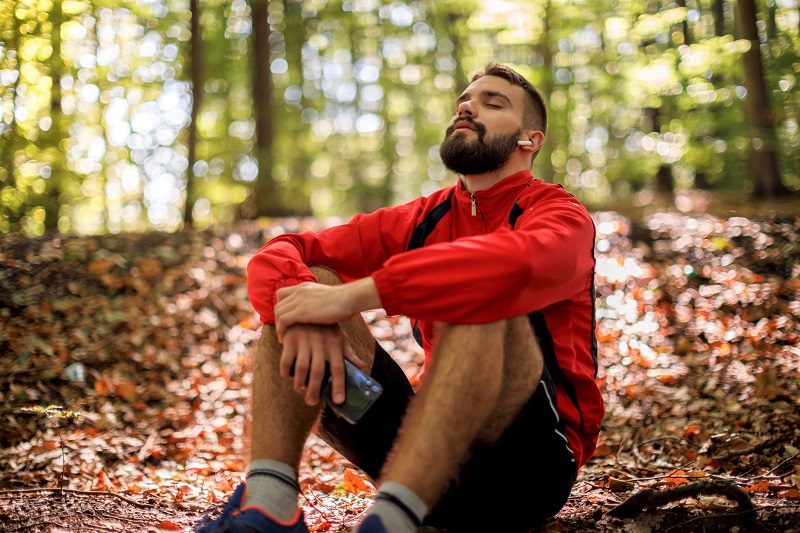
You can take the process of conscious breathing to the next level by thinking about relaxing each of your muscle groups. According to University of Michigan Health, Progressive Muscle Relaxation involves tensing a group of muscles as you inhale, then relaxing the muscles as you exhale. They recommend finding an audio recording at your local library or bookstore to walk you through each muscle group in order. Start by tensing up the muscles as you breathe in, then gradually releasing them as you breathe out. As you work your way through your body, visualize the stress and tension leaving that part of your body. You can try this progressive relaxation technique when you’re having trouble falling asleep, too.
3. Feel the sun.

The short daylight hours in winter and time spent almost exclusively indoors have a physical impact on us. Tri-City Medical Center explains that exposure to sunlight can increase serotonin levels and help prevent Seasonal Affective Disorder (SAD). Take time each day to go outside and feel the sunshine on your face. Just 10 minutes can make a big difference in how you’re feeling. Plus, a little fresh air and time in the great outdoors never hurts. Bonus: Exposure to sunlight helps your body produce vitamin D, which plays a key role in your immune system.
Feeling Stressed? 9 Foods That Make You Happy
Read More 
4. Walk it off.
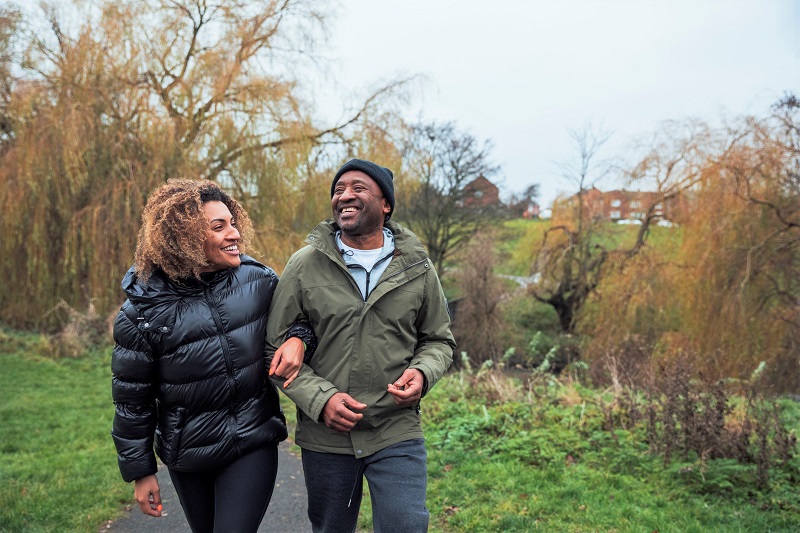
Nutrisystem’s dietitians recommend 30 minutes of daily activity to help you stay on track with your weight loss. According to Cleveland Clinic, “Aerobic exercise has been shown to release endorphins—natural substances that help you feel better and maintain a positive attitude.” Even just a brisk 10-minute walk in the middle of a stressful day can help relieve tension in your muscles and ease your worries.
5. Shimmy and shake.

Dancing is a fun way to burn calories and, according to research, it can help reduce stress. Harvard Health explains that dancing has been shown to increase levels of the “feel-good hormone” serotonin while creating new neural connections. Whether you enjoy disco or the foxtrot, line dancing or grooving solo, dancing uses up excess energy and draws your attention away from the causes of your stress.
6. Stretch out.

We most often feel stress first as tension in our muscles. Help your body to let it go by taking a quick stretch break. The American Council on Exercise (ACE) recommends trying some workday stretches to help relax your body and mind during stressful times. Deep breathing combined with stretches like the side neck stretch, seated spinal twist and desk downward facing dog can help target “desk-sitting muscles” while you disconnect from worries. As you release the physical tension, think about letting go of the stress you are feeling inside.
Tone Up While Sitting Down with 6 Easy Chair Exercises
Read More 
7. Massage therapy.

Getting a massage can be more than just a luxurious visit to the spa. Lying on a table as a professional kneads your tight muscles is sure to help you relax. A massage lowers your cortisol levels, according to a report in the International Journal of Neuroscience.
Arthritis Foundation recommends self-massage if you don’t have the time or budget to see a professional. You can get the benefits of massage in any situation by kneading the base of the muscle under your thumb, which can even relieve tension in the shoulders, neck and forehead. For a quick foot massage, take off your shoes and roll a ball (tennis or golf size) back and forth from your toes to your heel and along the instep of your feet.
8. Eat well.
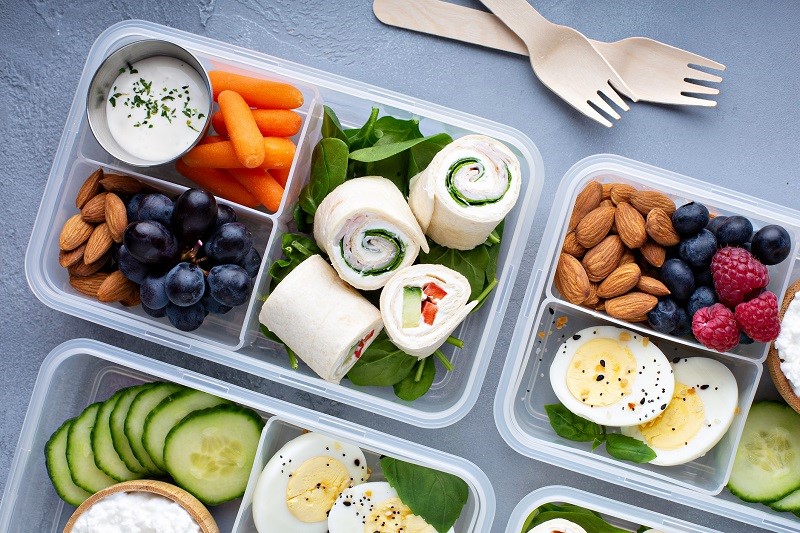
You know the food you eat affects your energy level and your mood. When stressed, you are likely to be tempted by foods that are high in calories, fat and sugar, says research from Harvard Health. Build your daily meals and snacks with lean protein, whole grains and fruits and vegetables, so your body is fueled up and well-nourished when you face stressful situations. Nutrisystem can help by crafting you a well-balanced meal plan that’s nutritious and delicious.
9. Easy answer.

Meal planning and preparation can make busy days even more stressful. Nutrisystem takes all the worry out of deciding what to have and the hassle of getting it ready. You can keep lots of choices on hand, so you never have to settle for a dull meal or unhealthy takeout. Your Nutrisystem meals are delivered right to your door, which gives you one less thing to worry about. Get started with your meal plan today! >
Why Stress Keeps You From Losing Weight (and How to Beat It!)
Read More 
10. Support yourself.

You can’t control the outside world, but you can take time each day to take care of yourself. Set a reminder to spend a few moments each day feeling good about eating a healthy diet and the progress you are making toward your weight loss goal. You deserve credit for your effort and who is better than you to appreciate that?
The post 10 Tips for a Stress-Free New Year appeared first on The Leaf.
from The Leaf https://ift.tt/3K40FeX
